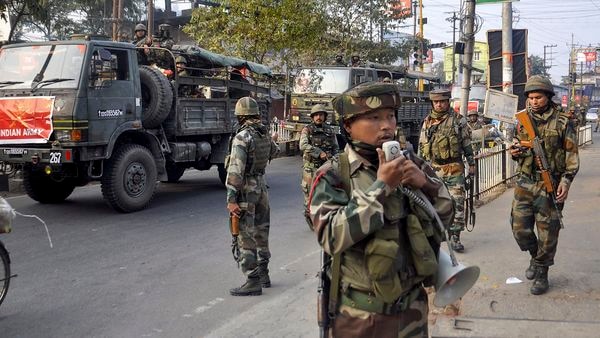
The turmoil over the Citizenship Amendment Act (CAA) in India is growing by the hour. The fire against the anti-constitutional Act that started in the Northeast, especially Assam is still raging and none of the strong-arm measures of the Army and police have deterred its spirit.
Zamser Ali, a senior journalist with Sabrang India brings the latest developments of the ongoing protests from the state.
Undying protests
The curfew that has been imposed in Assam for the past week, was relaxed today on December 17 throughout the state and in sensitive areas like Jorhat, Golaghar, Tinsukia and Dibrugarh, has been relaxed from 6 AM to 8 PM. Though broadband internet services have resumed, there is no saying when the mobile internet services will come on.
On the evening of December 16, a huge crowd of more than 10,000 people took part at a protest in Nagaon and Chabua. Today, in Barak Valley’s Algapur a crowd of similar numbers took to the streets to protest against the CAA at the call of the All Assam Students’ Union. Some protesters were also detained by the police but after a sometime, they were freed and allowed to go.
The hunger strike by the Asom Jatiyabadi Yuba Chatra Parishad (AJYCP) at the Ulubari High School is still going strong 36-hours in. Though the police tried to intimidate the peaceful protesters and tried to chase them away saying that the curfew was still on and they could not stage the hunger strike there, the protesters told the police that their strike was taking place inside the premises of a school and they were not protesting in public or disrupting public order. The police also tried to humiliate them, with Guwahati police officials accusing protesters of staging a ‘drama’, but the protesters did not back down and the police had to retreat.
The Jana Satyagraha (mass satyagraha) by AASU is still continuing in Assam at the village, districts and city level on its second day and the AJYCP is soon planning to hold similar satyagrahas throughout the state starting December 18.
Institutional tactics
Krishak Mukti Sangram Samiti (KMSS) and RTI activist Akhil Gogoi who had been arrested in Jorhat by the National Investigation Agency (NIA) under the Unlawful Assembly Prevention Act (UAPA) is now being shifted to Shillong for interrogation.
The Director General of Police (DGP) Bhaskar Jyoti Mahanta has said that the police has arrested 195 and detained more than 3,000 people throughout the state. The miscreants who have given a violent turn to the protest; apart from some leaders and some of the general public protesters have also been arrested. Eight public leaders have been arrested in Majuli allegedly to try and derail the public movement.
Himanta Biswa Sarma alleged the involvement of the opposition parties at the protest and vandalism at the Sankardev Kalakshetra. He also suggested that the movement in Ganeshguri, in front of the Assam Secretariat was provoked by elements of a particular religious and political identity. In Hatigaon (an area with a large presence of the Muslim community), he alleged that the motive of the movement taken up by the public from this area wasn’t the same as the motive of the movement of the people in other areas of Assam and they wanted to take the whole protest to a violent direction. He did not directly name any person or community and said that the government was investigating against these elements.
Sarma’s words, sources say, seem to questiont the authenticity of the movement. Hindus, Muslims, Assamese and Non-Assamese have all come together to oppose the CAA, but Sarma’s statements are seeking to divide all these groups on political, religious and linguistic lines.
SC’s rebuke
Meanwhile, the Supreme Court has refused to hear petitions seeking inquiries into violence at three places, including a West Bengal train station during a CAA protest. The bench headed by Chief Justice of India (CJI) Bobde asked the petitioner to file the plea at the Calcutta High Court. “We are not a trial court”, the Chief Justice said.
Up until now, prominent members of the BJP have resigned from their posts in support of protests against the CAA, the Indo-Japan summit stands cancelled and international universities and human rights organizations have condemned the killings and the police action on the students and the implementation of the bill by the ruling party.
Though the situation in Assam has calmed down, protests have gained steam in other parts of the country and the fight for the revocation of the unconstitutional CAA is now taken by the youth, the students of India who are unrelenting even in the face of brutality by the authorities to preserve the social, secular fabric of the country.